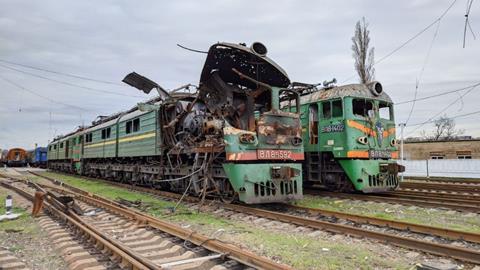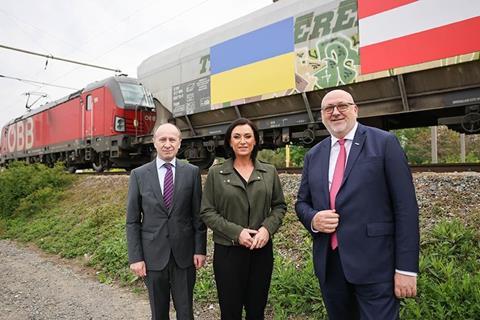
EUROPE: Rail has a central role in the European Commission’s plan to establish ‘Solidarity Lanes’ for the transport of Ukrainian agricultural exports which would normally use the Black Sea ports that are being blockaded by Russia.
Announcing its plan, the commission said the Russian blockade is threatening global food security, creating an urgent need for alternative transport routes. Ukraine is the largest exporter of sunflower oil (50% of world exports), the third largest of rapeseed (20%) and barley (18%), the fourth of maize (16%) and the fifth of wheat (12%).
In addition to addressing the immediate emergency, the commission is planning longer term measures to better connect Ukraine’s infrastructure with the EU.
‘Some 20 million tonnes of grains have to leave Ukraine in less than three months using the EU infrastructure. This is a gigantic challenge, so it is essential to co-ordinate and optimise the logistic chains, put in place new routes, and avoid, as much as possible, the bottlenecks’, said Commissioner for Transport Adina Vălean on May 12.
Commenting on the plan, Jolene Molitoris, Chair of the Support Ukraine Rail Task Force and a former US Federal Railroad Administrator, said that ‘with Ukrainian ports out of commission, once again we see the crucial role of the rail sector, both for Ukrainian society and the global economy.’
The Task Force ‘calls on the multinational rail community beginning with Europe and America to launch what may be the largest mobilisation project since the Second World War to move massive amounts of grain in a westerly direction.’
Urgent measures to optimise traffic
The European Commission said the average waiting time for railway wagons to cross the Ukrainian border is now 16 days, not helped by the break of gauge.

The commission is to work with member states, the Ukrainian authorities and the industry to set up a ‘matchmaking platform’ between logistics chain actors in order to optimise cargo flows and identify available capacity. The commission has called for EU market players to make rolling stock, lorries and vessels available, and for infrastructure managers and freight corridor partners to prioritise Ukrainian agricultural exports. Each member state should identify a dedicated Solidarity Lane contact point to allow stakeholders to report problems and bottlenecks.
The matchmaking platform will work with member states and industry to identify the key transhipment and gauge changing points in order to maximise throughput, and the commission has called on market players to urgently produce and lend or sell mobile grain loaders for transhipment locations.
The commission will also assess available storage capacity within the EU. It is to work with national authorities to identify bottlenecks caused by border procedures, and is urging member states to provide adequate capacity, apply ‘proportionate’ controls and waive non-essential requirements.
The Ukrainian government has already said it will cover the cost of wagons damaged or lost in the country, and the European Commission is to investigate the provision of additional financial guarantees to encourage wagon owners to allow their fleets to enter Ukraine.
Improving EU – Ukraine connectivity
Looking to the medium and longer term, the EU will work to increase the capacity of export corridors and establish new connections to support reconstruction.
The next Connecting Europe Facility call for proposals will allow support for improving connections to Ukraine, including railways and intermodal terminals.
The commission plans to sign a high-level agreement with Ukraine updating Trans-European Transport Network maps as part of its policy of extension to neighbouring countries.

















